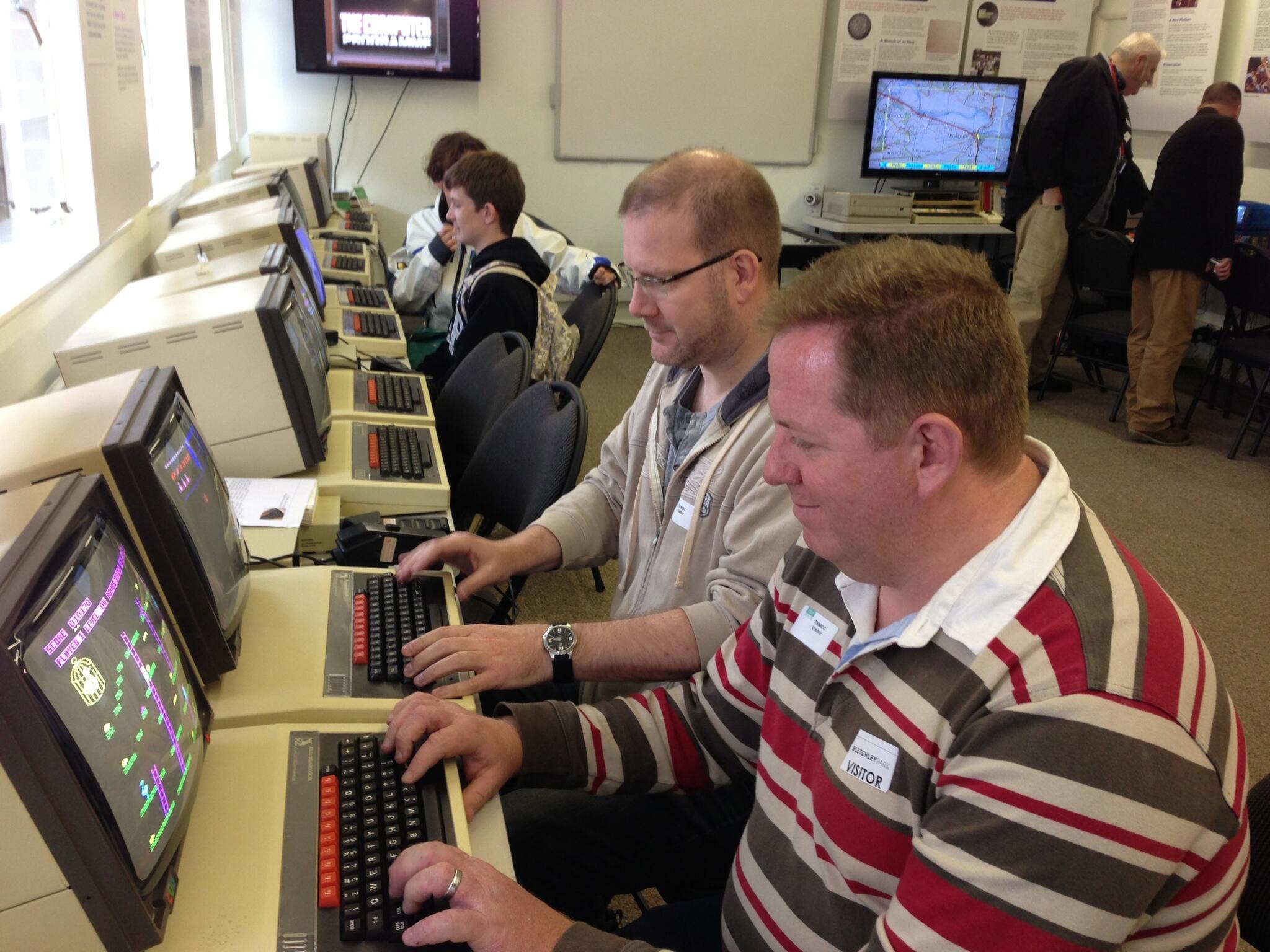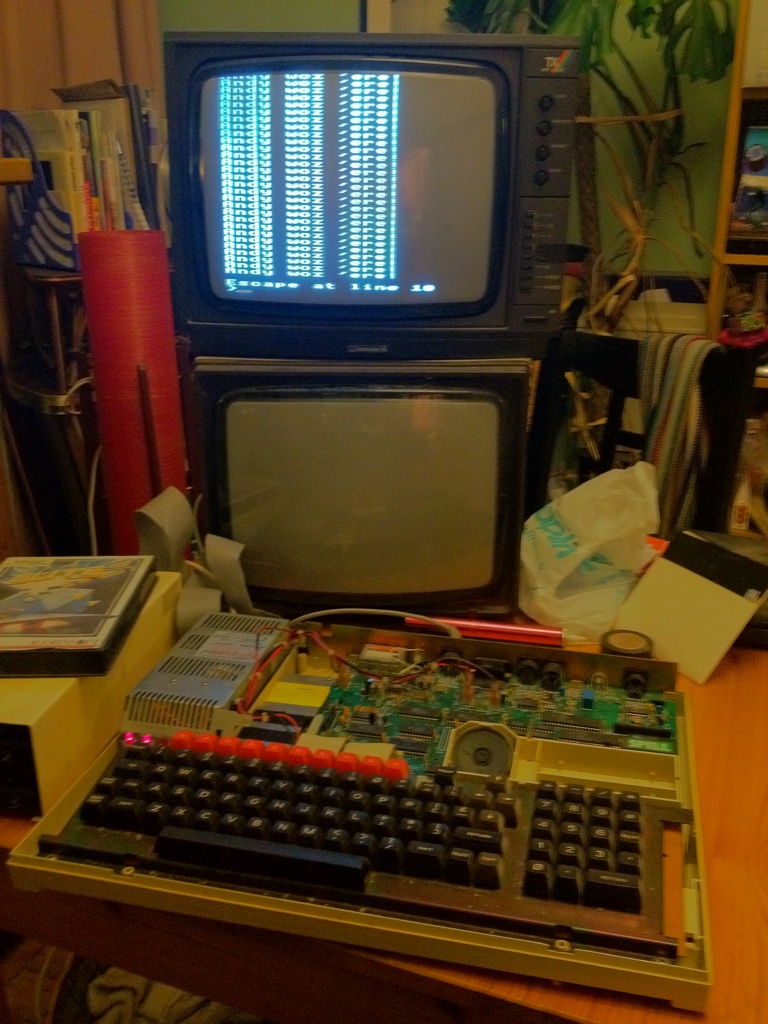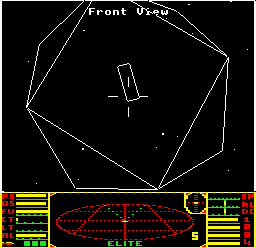All gone
 So, yesterday the deed was done. We went to TNMOC to donate my old BBC Micros.
They were happy to take the two Beebs themselves, plus the monitor and RGB TV along with the original software titles, books and magazines. They couldn't take the floppy drives (as they have a whole store-room full of them already), the non-original (copied) software and the VGA monitor from the old Apple Mac clone.
So, yesterday the deed was done. We went to TNMOC to donate my old BBC Micros.
They were happy to take the two Beebs themselves, plus the monitor and RGB TV along with the original software titles, books and magazines. They couldn't take the floppy drives (as they have a whole store-room full of them already), the non-original (copied) software and the VGA monitor from the old Apple Mac clone.
 In return we got a trip around the museum and to join in a couple of tours. The museum has really come on a long way since my last visit in 2009: in addition to the rebuilt Colossus and Heath Robinson code breaking machines, they now have a number of new galleries including one which opened only last week detailing the important role of women in computing, others show the progression from the earliest digital and analogue computers through to the modern day. Google, bless 'em, have put quite a bit of money into the museum recently, perhaps realising more than the government and heritage authorities in the UK what a rich and important part UK scientists, mathmaticians and engineers (you know - the geeks and nerds) played in developing the modern computer. Much of the recognition and plaudits for the early development work went to the other side of the Atlantic because until relatively recently (the late 80's and early 90's) most of the activity, inventions and developments that took place were still highly classified.
In return we got a trip around the museum and to join in a couple of tours. The museum has really come on a long way since my last visit in 2009: in addition to the rebuilt Colossus and Heath Robinson code breaking machines, they now have a number of new galleries including one which opened only last week detailing the important role of women in computing, others show the progression from the earliest digital and analogue computers through to the modern day. Google, bless 'em, have put quite a bit of money into the museum recently, perhaps realising more than the government and heritage authorities in the UK what a rich and important part UK scientists, mathmaticians and engineers (you know - the geeks and nerds) played in developing the modern computer. Much of the recognition and plaudits for the early development work went to the other side of the Atlantic because until relatively recently (the late 80's and early 90's) most of the activity, inventions and developments that took place were still highly classified.

Walking round the museum I remembered that I had written a school project on early computers when I was in what was effectively 2nd year at Senior school (around 1984). Even within my own lifetime, some 40 years after the end of the 2nd World War, the computers built and used at Bletchley Park were unknown to the general public. As a result, I wrote that the Americans built the worlds first programmable computer, ENIAC I think it was. Of course we now know that the credit should really go to the British - hoorah!
Of course the most exciting part of the museum (for us anyway) are the old BBC micros, Apples and games machines - of which there are many. I saw one of the machines that gave me my first taste of computing, even before my BBC, an Apple II.
 We spent quite a while playing the old games on the BBCs and desperately trying to remember the syntax for all the commands that would allow us to write "Andy woz 'ere" across the screens in multi-colour. They even had a BBC Doomsday project machine, complete with laser disc and trackerball which despiteknowing about it from when it was launched, I had never seen, let alone played around with one. As you might expect, it was somewhat basic compared with Google Maps but for something that was developed almost 30 years ago, it was groundbreaking.
So, all in all, an excellent day. Because of the donation, we got into the museum for free, but the very modest entrance fee of £5 is an absolute bargain, even if you just want to go and have a play on some old computers for a bit of nostalgia.
We spent quite a while playing the old games on the BBCs and desperately trying to remember the syntax for all the commands that would allow us to write "Andy woz 'ere" across the screens in multi-colour. They even had a BBC Doomsday project machine, complete with laser disc and trackerball which despiteknowing about it from when it was launched, I had never seen, let alone played around with one. As you might expect, it was somewhat basic compared with Google Maps but for something that was developed almost 30 years ago, it was groundbreaking.
So, all in all, an excellent day. Because of the donation, we got into the museum for free, but the very modest entrance fee of £5 is an absolute bargain, even if you just want to go and have a play on some old computers for a bit of nostalgia.
Childhood's end?
So after 30 years or so I've finally decided to get rid of my old BBC microcomputers once and for all (probably). I sold them once before to my cousin whilst I was away at Uni before purchasing them back once I graduated, but this time I think they need to go for good.
As much as I would like to think that one day I'll get organised and have time to repair them and get them up and running again, but I've come to the realisation that unlike some people I know who have scratch-built a ZX Spectrum from bits of wire and raw brainpower, I haven't the time, space or knowledge to repair this 30 odd year old technology anymore - even technology as "basic" as the BBC. And that's before you consider the 25+ year old 5 1/4" floppy discs that will have forgotten their contents years ago.
So, why the glum face? Well it feels like the end of an era, I don't know why particularly; they've been sat in boxes in the loft for the last four years and in the garage for the 8 years prior to that, so it's not like they've been well used over the intervening decades. I did manage to get the Master up and running last year (see picture left) but it wouldn't read from any of the floppy discs.
I guess it's because the BBC micro had such an effect on me all those years ago that I think it's safe to say that my entire education and career path since then can be traced back to all those hours spent labouriously typing out the programs in computer magazines line by line and then having to go back through them trying to work out why they didn't work and correcting the typos. I remember the BBC was an expensive bit of kit back in the early 80's, about £400 as I recall, which was not far off a months' salary, anything else I needed to buy myself, I saved up the money from Christmas, birthdays and my paper-round (a whopping £3.61 per week) to buy myself a top of the range Cumana 800k double floppy drive - only to have it stolen a few months later in a burglary. The insurance paid out and it was all replaced but I'd invested so much time and effort saving up for it that I was heartbroken.
Back in the 80's the BBC was the cutting edge of technology and we were using it at school and at home and it was relatively easy to become much more expert that parents and teachers (and the floor-staff at WH Smiths) in how to use (and abuse) it. I learned how to program on the Beeb (BBC Basic of course) and this later then led onto Pascal, C, Visual Basic and Perl which is where my career started and how I ended up where I am now.
Of course much of the entertainment came from playing and sharing games and to this date, one of the finest games ever created was on the BBC - Elite. I would spend hours at a time playing Elite - god knows how many days and weeks I must have racked up over the years. I think that one game more than anything else is why I hung on to the machines and hardware: in the vain hope that one day I might be able get them up and running again and relive those happy hours playing Elite until it was time to get ready for bed.
I now realise that a) I'm not going to get the machines up and running again and b) if I ever want to play Elite or indeed nay other game on the BBC I just need to download an emulator and save all the hassle.
So what am I going to do with them? Well, I thought about selling them on eBay, but then there's all the hassle of listing them, managing the auction and then dealing with the buyers, and frankly I can't be arsed with that. No, tomorrow, they are all going to The National Museum of Computing at Bletchley Park (the home of computing) where they can be used to support their classroom programme to educate and enthuse a new generation. With any luck, they'll experience some of the joy and satisfaction I derived from the hours I spent playing and tinkering around with my old BBCs.
I shall be sad to see them go, and I may kick myself at somepoint in the future, but right now I think it is the right thing to do.
Does this mean I have to grow-up now?
 So, yesterday the deed was done. We went to TNMOC to donate my old BBC Micros.
So, yesterday the deed was done. We went to TNMOC to donate my old BBC Micros. In return we got a trip around the museum and to join in a couple of tours. The museum has really come on a long way since my last visit in 2009: in addition to the rebuilt Colossus and Heath Robinson code breaking machines, they now have a number of new galleries including one which opened only last week detailing the important role of women in computing, others show the progression from the earliest digital and analogue computers through to the modern day. Google, bless 'em, have put quite a bit of money into the museum recently, perhaps realising more than the government and heritage authorities in the UK what a rich and important part UK scientists, mathmaticians and engineers (you know - the geeks and nerds) played in developing the modern computer. Much of the recognition and plaudits for the early development work went to the other side of the Atlantic because until relatively recently (the late 80's and early 90's) most of the activity, inventions and developments that took place were still highly classified.
In return we got a trip around the museum and to join in a couple of tours. The museum has really come on a long way since my last visit in 2009: in addition to the rebuilt Colossus and Heath Robinson code breaking machines, they now have a number of new galleries including one which opened only last week detailing the important role of women in computing, others show the progression from the earliest digital and analogue computers through to the modern day. Google, bless 'em, have put quite a bit of money into the museum recently, perhaps realising more than the government and heritage authorities in the UK what a rich and important part UK scientists, mathmaticians and engineers (you know - the geeks and nerds) played in developing the modern computer. Much of the recognition and plaudits for the early development work went to the other side of the Atlantic because until relatively recently (the late 80's and early 90's) most of the activity, inventions and developments that took place were still highly classified.  We spent quite a while playing the old games on the BBCs and desperately trying to remember the syntax for all the commands that would allow us to write "Andy woz 'ere" across the screens in multi-colour. They even had a BBC Doomsday project machine, complete with laser disc and trackerball which despiteknowing about it from when it was launched, I had never seen, let alone played around with one. As you might expect, it was somewhat basic compared with Google Maps but for something that was developed almost 30 years ago, it was groundbreaking.
We spent quite a while playing the old games on the BBCs and desperately trying to remember the syntax for all the commands that would allow us to write "Andy woz 'ere" across the screens in multi-colour. They even had a BBC Doomsday project machine, complete with laser disc and trackerball which despiteknowing about it from when it was launched, I had never seen, let alone played around with one. As you might expect, it was somewhat basic compared with Google Maps but for something that was developed almost 30 years ago, it was groundbreaking.





